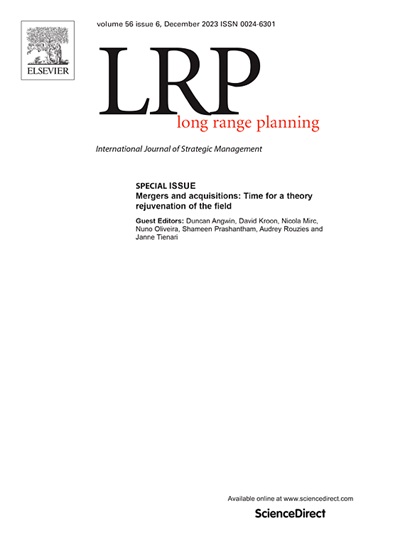Sustaining authenticity while enabling adaptation: Discursively navigating strategy-identity tensions over time
IF 6.3
2区 管理学
Q1 BUSINESS
引用次数: 0
Abstract
Over time, environmental pressures may push organizations to engage in strategic actions that diverge from their foundational identity claims. In such circumstances, organizations experience tensions between pressures for authenticity on the one hand, and pressures for adaptiveness on the other. Such pressures are likely to be of particular importance for organizations that have historically laid claim to a strong social mission. Drawing on a longitudinal study of a large cooperative financial services organization, this study examines how leaders discursively navigate strategy-identity tensions when strategic actions appear inconsistent with historically valued identity attributes. We identify three types of discursive practices leaders may engage in to navigate strategy-identity tensions: (i) pacing; (ii) sensegiving; and (iii) revising. In so doing, we show how leaders may work to enable strategic actions that might be perceived as contrary to key organizational identity attributes, with each of the practices serving different and complementary roles. At the same time, we show how successive recalibrations of the grounds for authenticity enacted in practices of pacing, sensegiving and revising can result in claims of organizational distinctiveness that while continued and insistent, could also become increasingly contestable.
在适应的同时保持真实性:随着时间的推移,话语导航策略-身份紧张
随着时间的推移,环境压力可能会促使组织采取偏离其基本身份主张的战略行动。在这种情况下,组织一方面面临真实性的压力,另一方面面临适应性的压力。这种压力对于那些历史上声称有强大社会使命的组织来说可能尤为重要。通过对一家大型合作性金融服务组织的纵向研究,本研究考察了当战略行动与历史上重视的身份属性不一致时,领导者如何通过话语来应对战略认同的紧张关系。我们确定了领导者可能参与的三种类型的话语实践,以应对战略认同紧张局势:(i)节奏;(2) sensegiving;(三)修改。在这样做的过程中,我们展示了领导者如何工作来实现可能被视为与关键组织身份属性相反的战略行动,每个实践都服务于不同的互补角色。与此同时,我们展示了在节奏、感官赋予和修改实践中对真实性基础的连续重新校准如何导致组织独特性的主张,这种主张虽然持续和坚持,但也可能变得越来越有争议。
本文章由计算机程序翻译,如有差异,请以英文原文为准。
求助全文
约1分钟内获得全文
求助全文
来源期刊

Long Range Planning
Multiple-
CiteScore
13.00
自引率
7.10%
发文量
75
期刊介绍:
Long Range Planning (LRP) is an internationally renowned journal specializing in the field of strategic management. Since its establishment in 1968, the journal has consistently published original research, garnering a strong reputation among academics. LRP actively encourages the submission of articles that involve empirical research and theoretical perspectives, including studies that provide critical assessments and analysis of the current state of knowledge in crucial strategic areas. The primary user base of LRP primarily comprises individuals from academic backgrounds, with the journal playing a dual role within this community. Firstly, it serves as a platform for the dissemination of research findings among academic researchers. Secondly, it serves as a channel for the transmission of ideas that can be effectively utilized in educational settings. The articles published in LRP cater to a diverse audience, including practicing managers and students in professional programs. While some articles may focus on practical applications, others may primarily target academic researchers. LRP adopts an inclusive approach to empirical research, accepting studies that draw on various methodologies such as primary survey data, archival data, case studies, and recognized approaches to data collection.
 求助内容:
求助内容: 应助结果提醒方式:
应助结果提醒方式:


